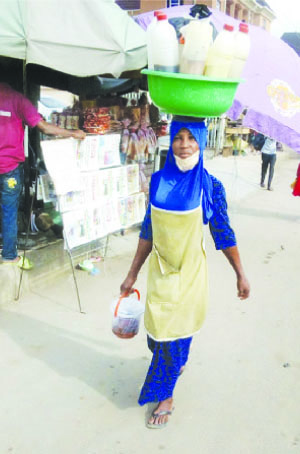Priscilla Ediare, Ado-Ekiti
The business of selling local herbal drinks in Ekiti State is synonymous with financial liberation. Those involved in the business are women, who employ women and girls to hawk for them, while they coordinate their activities.
They scout for their employees, majority of whom are from Osun, Kwara, Oyo and Ondo states. The coordinators get the raw herbs, prepare them while the employees are to hawk the prepared drink and deliver to the coordinators an agreed amount of money on weekly basis.
The herbal drinks called “Agbo” in Yoruba Language are displayed in white plastics (two litres), 75cl bottles or transparent plastic buckets with lids. It is usually served hot and can be taken ordinarily or together with herbal powder, called “Agunmu.”
The hawkers, or “Iyalagbo”, and their patrons believe the herbal mixture helps in treating various ailments like malaria, typhoid fever and back pain. They sell from N50 without the herbal powder and from N100 with it.
The hawkers traverse busy streets and crowded places with their wares stocked in a basin, placed on their heads with support of a knot. They brandish transparent plastic containing sticks of fried meat and pomo. These are garnished with pepper sauce and sliced onions. The stick meat is sold for N50 each, which the hawkers help reduce the bitter taste of the drink. It is also used to boost their sales.
Some of their target areas in Ado-Ekiti metropolis include, Okeyinmi, Matthew, Odo-Ado, Ajilosun, Okebola, Old Garage, New Garage, Bank Road, Okesa and Dallimore. Others are State Hospital Road, Okeila, Ori-Apata, Adebayo, Adehun, Atikankan, Ijigbo, Ekute and Basiri. They look for customers around motor parks, clubs, beer and pepper soup joints, car wash spots, banks, hotels and filling stations.
They get low patronage from women and girls, but enjoy high patronage from men and boys (those just entering adulthood). This is because the males believe that in addition to treating ailments, it has some properties to enhance their libido.
Investigation, however, revealed how financial constraints pushed the hawkers into the business. Mrs Falilat Ibrahim, from Kwara State, said: “ I didn’t have money to do business where I came from. I learnt how to cut polythene materials but I couldn’t raise money to do the business. That is the reason I came down to Ekiti.
“I got into the business through an aunt who was into it. I hawk only in the evening and make daily sales of sometimes N5,000 together with sales of fried meat. Without fried meat, I sell close to N2,000. The fried meat helps boost sales. I deliver N3,000 weekly after sales from Monday through Saturday to my madam.
“I have been in this for sometime now and wish to discontinue and go back to Ilorin once I raise enough money to do my polythene business.”
Miss Iyabo Iyiola from Oyo State said: “I have skills in tailoring. I know how to sew and need money for freedom so that I can be on my own. That is why I am doing this business.
“I hawk mornings and evenings. I make daily sales of close to N7,500, though it varies, sometimes lesser or higher than. The stick meat I sell with the drink boosts my sales as some will only go for the meat. I deliver N 7,000 weekly.
“I have been hawking this drink for some nine months now. In another three to four months, I will quit and travel back to Oyo to do my freedom and start to commercialise the tailoring I have learnt.”
Mrs Kuburat Azeez from Ilorin in Kwara State said: “I came to Ekiti to hawk this drink so that my children can go to school, because I didn’t go to school. Gone were the days when children were used as maids in homes, nowadays, parents work for their children. My children are in Ilorin. They come around to see me during their holidays.
“Whoever shows interest in this business, our boss will pay for the person’s transport fare down to Ekiti and secure accommodation for her.”
Azeez didn’t disclose how much she makes daily and the amount she delivers weekly. She said some of her co-hawkers leave their gains with their coordinators to keep for them and collect at certain periods:
“The reason I and other hawkers keep our gains with our boss is because of past experiences where some of us who were duped. It also prevents us from unnecessary spending. I hope to stop hawking by the end of this year and reunite with my family.”
Mrs Monsurat Rasaq from Ikire in Osun State said: “I resorted to hawking when my marriage hit the rock and I am left with four children to cater for. I used to operate a saloon before the crisis started. A friend brought me to Ekiti and introduced me to the woman (my boss) instead of prostituting about.
“I hawk every morning till about afternoon and resume when it is 5:00 in the evenings and return to her (owner) before 9:00pm. I deliver N 7,000 every Saturday without fried stick meat, though it varies. This is because I sell for longer hours. I don’t hawk fried meat at all.
“It has been six months I have been in Ekiti. I hope to stop hawking when I raise enough money to start up something that can provide daily income for me and my children.”

